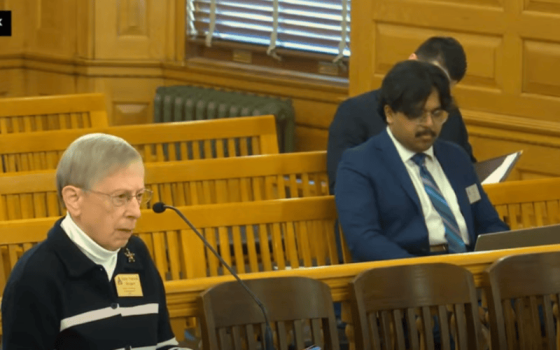
ST. PAUL, Minn. -- For Miguel and Gabriela, leaving Mexico and ultimately settling in Minnesota a decade ago was a wrenching process, in part made necessary by the diagnosis of lupus that explained Miguel's persistent sickness.
But though they say life is mostly better for them in the United States, the couple from Sacred Heart Parish in St. Paul said they live in constant fear of being arrested for being in the country without documents and of then being separated.
The couple spoke with The Catholic Spirit and Espiritu Catholic, the English- and Spanish-language newspapers of the Archdiocese of St. Paul and Minneapolis, on the condition their real names not be used because they worry about being targeted by immigration enforcement authorities.
In their apartment decorated with a wedding photo, an image of Our Lady of Guadalupe and a giant carved wood rosary, Miguel, 37, and Gabriela, 40, gave a matter-of-fact description of their life in Mexico.
"We were living with Miguel's father and the house was very small. There were a lot of family members living in the house and not much space," Gabriela explained. "Miguel had to work all day, and there was little money. He worked at a gas station, and after that he worked at a brewery. He earned about 1,000 pesos ($84) a month, 250 pesos ($21) a week, working 10 to 12 hours a day."
By the time they had two children, the financial squeeze was very tight.
"We didn't have money to pay rent or for the children's education," Miguel said.
That led them to follow millions of others across the U.S. border in hopes of "better work, a better life and better everything," Gabriela said. "We didn't even have a place of our own to live."
Miguel came first, and later, Gabriela and their two children, then ages 2 and 8, floating across the Rio Grande in inner tubes.
"You're exposed to danger, and the children are exposed, too," she recalled. "You can die, because the current can carry you away, and it scares the children. I remember that my youngest child was crying. Yes, it was very, very dangerous."
Once across the river, they were met by someone who took them to a bus station, where they headed north.
"I think now, someone could have taken one of my sons," Gabriela said. "I was alone. What could I have done? I didn't know anyone. Sometimes I think about it, and I don't think I would do it again. But thank God it all turned out well for us."
Miguel's lupus affects his memory, making it difficult to work. An uncle who is a doctor helped get the disease under control on a two-month return trip to Mexico that Miguel doesn't remember. But ultimately the cost of treatment in Mexico would have been too much. Back in Minnesota, they were able to qualify for low-cost medical insurance through a local nonprofit organization.
"We've had good things and bad things happen, but there are very good doctors that have helped Miguel a lot because he's receiving a treatment that's extremely expensive," Gabriela said.
"Thank God I'm taking medications," Miguel said, "though I pray to God that one day I won't have to take them. But it's been seven years now. I really don't have a choice."
The couple are keenly aware of the ongoing debate about immigration laws and policies, watching for any changes that will make it possible for their children, now ages 16 and 11, to be able to go to college and work legally.
"We're always thinking that it's going to be very difficult to fix our immigration situation," Gabriela said. "But returning to our country would be even more difficult because of Miguel's illness. Here, in one way or another, he' s receiving treatment. His doctor says that if he returned to Mexico, he wouldn't do well because there isn't the same support, even more so because of how aggressive his illness is.
"All of the immigration laws that have been added through the years do scare us because we don't know what can happen," she continued."We could be separated, and that scares us."
"The U.S. is like a coin with two sides because it has meant something good in terms of being able to better ourselves -- all in all, I believe we're living better than in our country -- although we're finding that we're suffering a lot of discrimination and encountering a lot of obstacles for not having documents," she said. "This is a country of a lot of opportunity, but it doesn't give opportunity to everyone. There are positives and a lot of negatives, but maybe there are more positives."
Faith and their involvement in hospitality ministry at Sacred Heart is what helps them carry on.
"The truth is that we entrust ourselves to God because we know he will keep us safe," Miguel said. "But when we leave the house, we don't know if we're going to return."
"It's our faith that has given us the strength to endure the things that have come to us, like illness and the scarcities we've had over the years," said Gabriela."Only by means of our faith have we been able to go forward."
[Contributing to this story were Julie Carroll and Maria Capouch.]
 To see all of NCR's coverage of immigration, see our new blog: Immigration and the Church. To receive a weekly e-mail update with highlights from the blog, follow this link to the sign-up page. If you already receive e-mail alerts from NCR, add Immigration and the Church to your profile. To see all of NCR's coverage of immigration, see our new blog: Immigration and the Church. To receive a weekly e-mail update with highlights from the blog, follow this link to the sign-up page. If you already receive e-mail alerts from NCR, add Immigration and the Church to your profile. |



